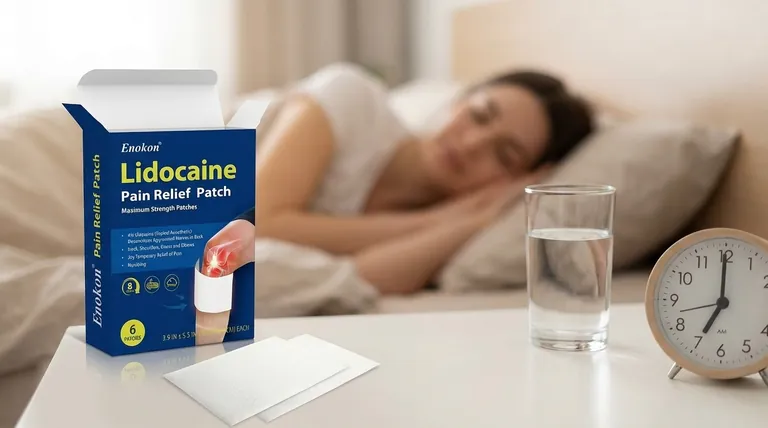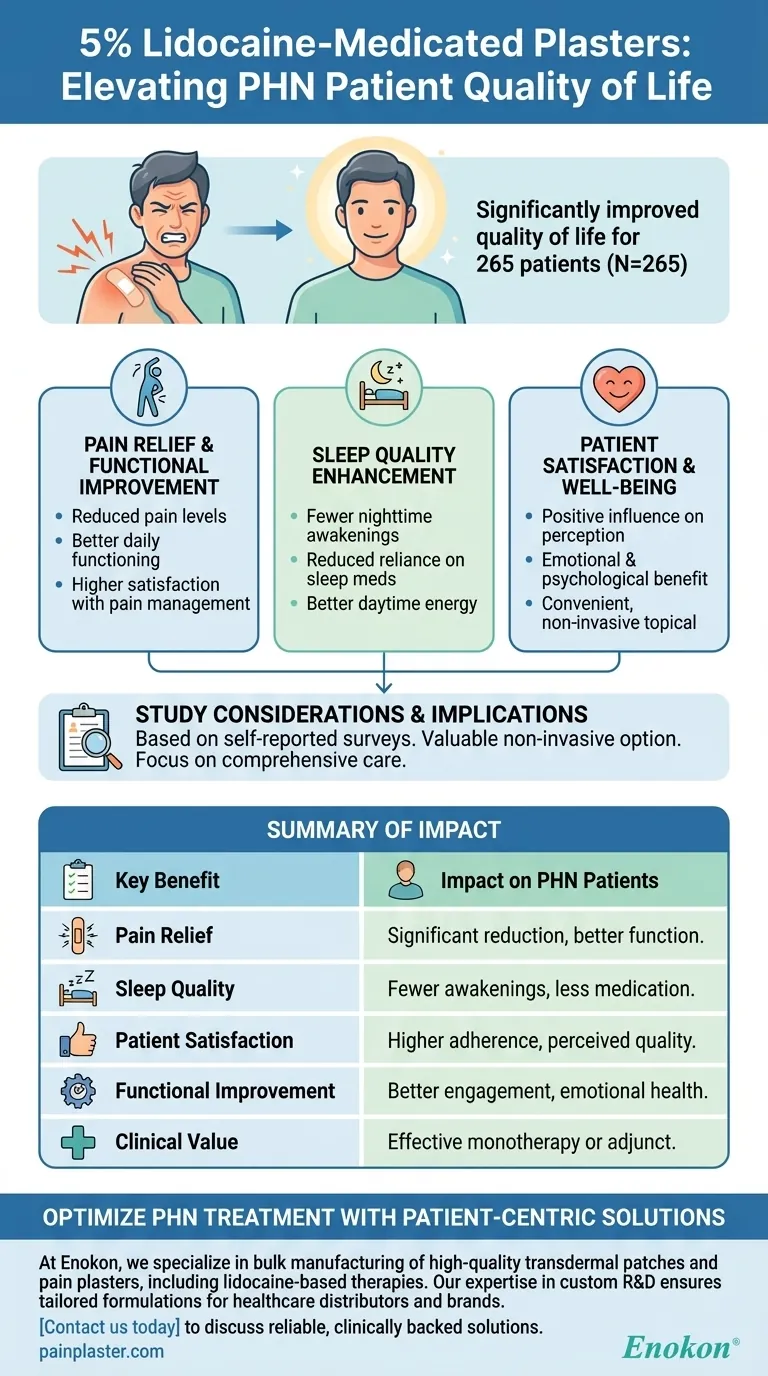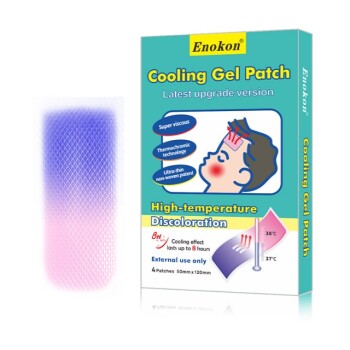The use of 5% lidocaine-medicated plasters significantly improved the quality of life for patients with postherpetic neuralgia (PHN). Studies involving 265 patients demonstrated enhancements in pain relief, sleep quality, daily functioning, and overall satisfaction. Patients reported fewer sleep disturbances, reduced reliance on sleep medications, and fewer awakenings due to pain. The plasters, whether used as monotherapy or adjunct therapy, provided benefits extending beyond pain management, positively impacting multiple aspects of patient well-being. However, these findings are based on self-reported surveys, which should be considered when interpreting the results.

Key Points Explained:
-
Pain Relief and Functional Improvement
- The 5% lidocaine-medicated plasters significantly reduced pain levels in PHN patients, as evidenced by self-reported surveys.
- Improved pain control led to better daily functioning, allowing patients to engage more comfortably in routine activities.
- The study highlighted that current users of the plaster reported higher satisfaction with their pain management compared to non-users.
-
Sleep Quality Enhancement
- Patients using the lidocaine plaster experienced fewer difficulties falling asleep and had fewer nighttime awakenings due to pain.
- There was a notable reduction in the use of sleep medications, suggesting that the plaster alleviated pain-related sleep disturbances.
- Improved sleep quality contributed to better overall well-being and daytime energy levels.
-
Patient Satisfaction and Quality of Life
- Beyond pain relief, the plaster positively influenced patients' perception of their quality of life.
- The study concluded that the benefits of the treatment extended to emotional and psychological well-being, as patients felt more in control of their condition.
- The convenience of a topical treatment (compared to systemic medications) may have also contributed to higher adherence and satisfaction.
-
Study Limitations
- The findings were derived from self-reported data, which may introduce bias or variability in responses.
- Further controlled studies could strengthen the evidence by comparing lidocaine plasters with other treatment modalities.
- Despite limitations, the consistent positive feedback from a large sample size (265 patients) supports the plaster's efficacy in PHN management.
-
Clinical Implications
- The 5% lidocaine plaster offers a non-invasive, well-tolerated option for PHN patients, either as standalone therapy or alongside systemic medications.
- Its impact on sleep and daily functioning makes it a valuable tool for comprehensive PHN management.
- Healthcare providers should consider patient-reported outcomes when evaluating treatment success, as quality of life improvements are as critical as pain reduction.
The 5% lidocaine-medicated plaster represents a meaningful advancement in managing PHN, addressing not just pain but also the broader challenges patients face. Have you considered how such topical therapies could simplify treatment regimens for chronic pain sufferers? These innovations quietly reshape how we approach neuropathic pain, blending efficacy with patient-centric care.
Summary Table:
| Key Benefit | Impact on PHN Patients |
|---|---|
| Pain Relief | Significant reduction in pain levels, improving daily functioning and comfort. |
| Sleep Quality | Fewer nighttime awakenings, reduced reliance on sleep medications. |
| Patient Satisfaction | Higher adherence and perceived quality of life due to non-invasive topical application. |
| Functional Improvement | Better engagement in routine activities and emotional well-being. |
| Clinical Value | Effective as monotherapy or adjunct therapy, with minimal systemic side effects. |
Optimize PHN treatment with patient-centric solutions
At Enokon, we specialize in bulk manufacturing of high-quality transdermal patches and pain plasters, including lidocaine-based therapies. Our expertise in custom R&D ensures tailored formulations for healthcare distributors and brands, enhancing patient outcomes while simplifying chronic pain management.
Contact us today to discuss how our reliable, clinically backed solutions can support your product line or patient care initiatives.
Visual Guide

Related Products
- Lidocaine Hydrogel Pain Relief Patch for Pain Relief
- Far Infrared Deep Heat Relief Patches Medicated Pain Relief Patches
- Capsaicin Chili Medicated Pain Relief Patches
- Natural Herbal Wormwood Patch Pain Plaster
- Heating Pain Relief Patches for Menstrual Cramps
People Also Ask
- What is the important note regarding the information provided about lidocaine 5 percent topical patch?
- What were the safety findings of the lidocaine patch 5% in the study? Key Insights on Tolerability & Efficacy
- How do lidocaine patches differ from Icy Hot and Biofreeze patches in their mechanism of action?
- What are some off-label uses of the Lidoderm patch? Exploring Alternative Pain Relief Options
- How does an industrial-grade ultrasonic processor influence Lidocaine nano-liposomes? Key to Particle Size & Stability
- How should lidocaine patches be applied for optimal use? Maximize Pain Relief with Proper Application
- What is the generic name of the Cold and Hot Pain Relief 5% Topical Patch? Key Ingredients Explained
- What special precautions apply to lidocaine patch use? Essential Safety Guide for Maximum Relief















